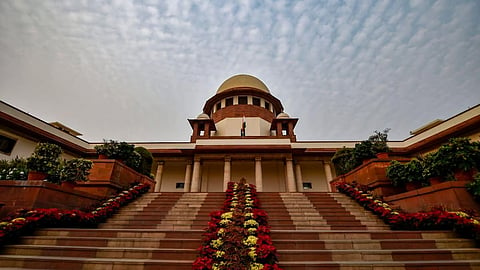

NEW DELHI: Coming down hard on 'bulldozer justice', the Supreme Court on Wednesday laid down pan-India guidelines on demolition of properties and said the Executive cannot become a judge, declare an accused as guilty and demolish his house.
"If the Executive, in an arbitrary manner, demolishes the house of a citizen only on the ground that they are accused of a crime, then it acts contrary to the principles of rule of law," a bench of Justices B R Gavai and K V Viswanathan said.
Passing a slew of directions, the bench said, "No demolition should be carried out without a prior show cause notice returnable either in accordance with the time provided by the local municipal laws or within 15 days time from the date of service of such notice, whichever is later".
The apex court said it will be "totally unconstitutional" if houses of people are demolished merely because they are accused or even convicts.
The Executive can't replace the Judiciary in performing its core function, Justice Gavai said while pronouncing the verdict.
"If the Executive acts as a judge and inflicts penalty of demolition on a citizen on the ground that he is an accused, it violates the principle of separation of powers," the bench said.
The top court said in order to allay the fears in the mind of the citizens with regard to arbitrary exercise of powers by the officials of the State, "we find it necessary to issue certain directions in exercise of our powers under Article 142 of the Constitution".
Article 142 empowers the apex court to pass any decree or order necessary for doing complete justice in any case or matter pending before it.
While pronouncing the judgement, the bench said even after order of demolition are passed, the affected parties needs to be given some time so as to challenge the order before an appropriate forum.
It said even in cases where people do not wish to contest the demolition order, sufficient time needs to be given to them to vacate and arrange their affairs.
"It is not a happy sight to see women, children and ailing persons dragged to the streets overnight," it said, adding, "Heavens would not fall on the authorities if they hold their hands for some period".
The bench directed that notice shall be served upon the owner by registered post and additionally, notice shall also be affixed on the outer portion of the structure.
"The time of 15 days state herein above shall start from the date of receipt of the said notice," it said.
The bench clarified that its directions will not be applicable if there is any unauthorised structure in any public place such as roads, streets, footpaths, abutting railways lines or any river or water body and also to cases where there is an order for demolition made by a court of law.
It also directed that proceedings of demolition shall be video-graphed.
"Needless to state that the authorities herein after shall strictly comply with the aforesaid directions issued by us," it said, adding that violation of any of its directions would lead to initiation of contempt proceedings.
It said accused and convicts have certain rights and safeguards in light of the Constitution and the criminal law.
The top court delivered its verdict on pleas seeking framing of guidelines on demolition of properties in the country. It had reserved its verdict in the matter on October 1.
While hearing the matter, the top court had said it will lay down pan-India guidelines and made it clear that any religious structure in the middle of a road, be it a 'dargah' or a temple, "has to go" because public interest is paramount.
It had said merely because somebody is an accused or even a convict cannot be a ground for demolition of property.
A batch of pleas alleged that properties, including of those accused of crime, were being demolished in several states.
While hearing the matter earlier, the top court had observed that even one instance of illegal demolition was against the "ethos" of the Constitution.
Last week, in a separate matter, the apex court had said that citizens' voices cannot be throttled by a threat of destroying their properties and 'bulldozer justice' is simply unacceptable under the rule of law.